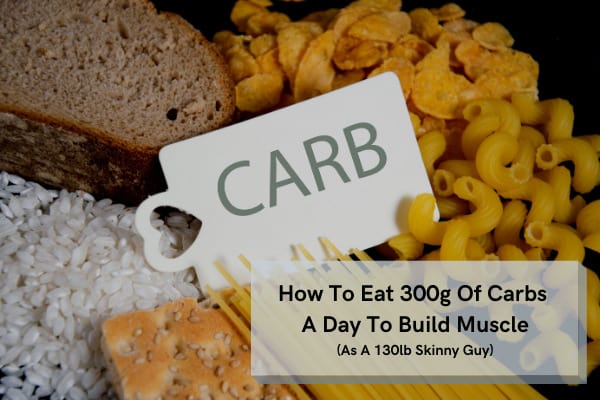Are you looking to bulk up, but have no idea how to hit your carb target without exploding? If you are, then keep reading. Because today I will be sharing my personal insight on how to eat 300g of carbs a day.
Eating 300g of carbs a day can be achieved by splitting your carb intake across 5 or more meals to prevent over-satiety. Additionally, a higher carb intake should be allocated to breakfast, before a workout, and immediately after a workout, when your body requires the most carbohydrates.
When I first began my bulking journey, the carb conundrum was a source of serious frustration.
I was a 130lb skinny guy looking to pack on muscle.
I knew exactly what I needed to do (to hit my daily 300g carb target). But I had no idea how I was going to do it!
I could barely get to 200g per day without gagging, getting bloated, and generally feeling s%*t.
But by spreading my meals, and making my carbs more appetizing, I was able to hit my goals.
This is why I want to share my experience with you today.
So when you are ready….
Let’s get stuck in!
- 300g Of Carbs A Day Will Fuel Muscle Growth
- Up Your Glycogen Game
- Carbs Are Not Created Equal!
- Eat Your Carbs Strategically!
- An Example Meal Plan To Eat 300g Of Carbs A Day
- 1. Breakfast Oats (77g Carbohydrates)
- 2. Pre-Workout Pasta (75g Carbohydrates)
- 3. Post-Workout Sandwich (87g Carbohydrates)
- 4. Dinner (30g Carbohydrates)
- 5. Pre-Bed Cheesy Crackers (50g Carbohydrates)
- Delicious Carbs Are Easy To Eat Carbs
- Conclusion
First, check out Stephanie Buttermore’s delicious 300g of carbs-a-day diet plan for inspiration!
300g Of Carbs A Day Will Fuel Muscle Growth
Most people will think you’ve gone mad if you were to tell them you were trying to eat so many carbohydrates.
Besides, carbohydrates are not an essential nutrient. This means your body can survive just fine without them.(1)
So why do you even need 300g of carbs per day?!
The fact of the matter is this- though not essential for survival, carbohydrates are essential for providing your body with the energy to effectively work out for muscle gains.
Without carbs, you simply wouldn’t be able to push nearly as hard when lifting weights.
Therefore, carbs are essential to fuel the muscle growth process.
Check out my other article for a step-by-step guide to lifting weights for muscle growth!
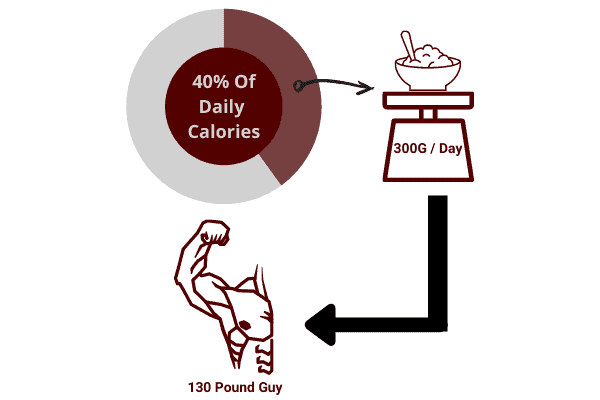
So why eat 300g of carbs specifically? Why not reduce it to 200g? Or bump it up to 400g?!
Well, those looking to gain muscle are recommended to consume around 4-7g of carbohydrates per kg of body weight per day.(2)
So if you are a 130-pound skinny guy (59kg), you would have to eat between 236g to 413g of carbohydrates each day.
So let’s assume a median of 300g of carbs per day for a 130lb guy.
This equates to around 45% of your total caloric intake for a bulking diet to gain muscle.
Summary
Building muscle requires you to consume 4 to 7 grams of carbohydrates per kg of body weight per day. As a 130lb individual, this equates to an average consumption of 300 grams of carbohydrates every day. And this will provide the body with the energy required for intense resistance training.
Up Your Glycogen Game
Have you ever what happens to those carbs you consume?
Because if you did, then you would understand why you need to consume a high-carb diet to build muscle.
So let me explain.
A high-carb diet is required to sustain your muscular glycogen levels.(3)
When you eat carbohydrates, your body digests them into sugars. And these sugars are used in two ways:
- Directly for energy.
- Turned into glycogen for stored energy.
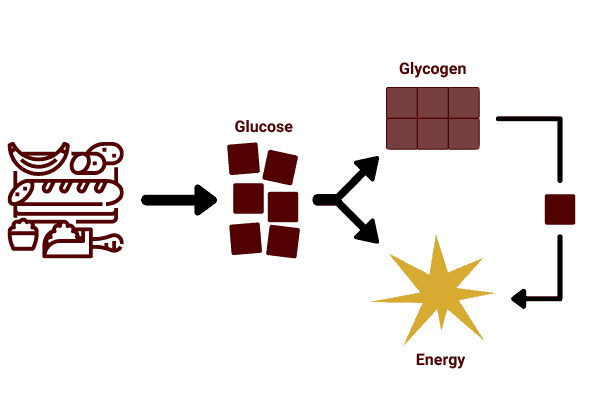
Glycogen is basically a big chain of sugars that are stored in your muscles and liver.(4)
And when you perform high-intensity exercise (such as weight lifting), you expend a tremendous amount of energy.
In fact, so much energy is required, that the body’s blood sugar (the default route for energy delivery) cannot cope with the new demand.
So what does it do?
It tap into the muscular glycogen reserves for energy!
Therefore maintaining your muscular glycogen levels is essential to fuel the intense workouts required for muscle growth. And you maintain your glycogen levels by consuming a lot of carbohydrates!
It just so happens, that a 130lb dude will need to eat around 300g of carbs a day to maintain optimal glycogen levels!
Summary
Consuming carbohydrates is essential to sustain muscular glycogen stores. Glycogen is an energy-storage molecule that the body uses during intense exercise such as weight lifting. Maintaining your glycogen stores will allow you to keep your workout at an intensity high enough to build muscle.
Carbs Are Not Created Equal!
In addition to consuming a high-carbohydrate diet, you will also need to carefully consider what types of carbs you are consuming.
That’s because different carbohydrates are digested differently.
As such, they are used by your body in different ways.
There are 2 main types of carbs that your body utilizes for energy and glycogen repletion:(5)
- Complex carbohydrates (aka starches)- such as potatoes, whole grain pasta, brown rice, whole grain bread, and legumes.
- Simple carbohydrates (aka sugars)- such as fruit, confectionery, sweets, white rice, and white bread.
Both carbs serve to provide your body with energy. And both also facilitate the glycogen repletion process.
But they differ in their rates of digestion.
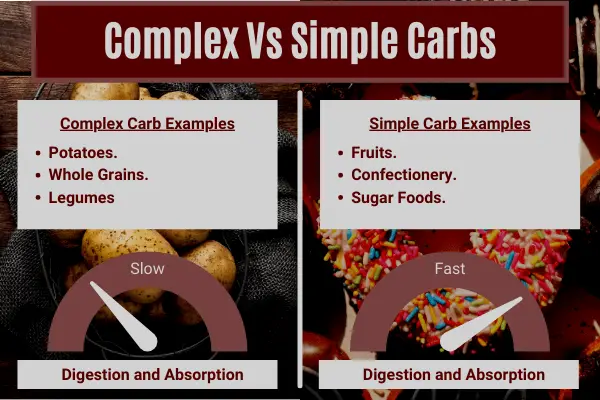
Complex carbs are digested and absorbed slowly.
In comparison, simple carbs are digested and absorbed quickly.
And absorption rate has direct implications on how how much complex vs simple carbs you should be consuming.
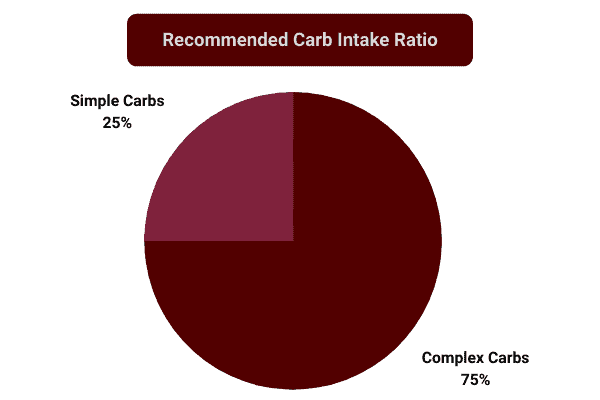
As a general rule for the average joe, I would recommend a simple:complex carb intake ratio of 1:4.
In other words, no more than 25% of your 300g of carbs a day should come from fruit and other sugary foods.
Likewise, 75% of your 300g of carbs a day should come from potatoes, whole grain products, and other starchy foods.
The reason for this is that only so much glycogen can be stored by your body.(6)
As well, only a limited amount of glycogen can be made for a given amount of time.(7)
Consequently, if you were to consume ALL your carbohydrates from simple carbs (as an extreme example), much of the sugar would be stored as fat rather than glycogen.
What you need to do instead, is consume most of your carbohydrates from complex carbs (which are absorbed by the body at a slower rate)
And this gives your body the chance to convert the sugars into glycogen rather than fat.
Summary
25% of your total carbohydrate intake should come from simple carbohydrates, with the remaining 75% coming from complex carbohydrates. This results in a balanced carbohydrate absorption profile that is beneficial for maximal glycogen production and storage. And this will maximize muscular glycogen levels.
Eat Your Carbs Strategically!
Great, now you know how to split your carb consumption.
But if you are on this page, your real question is most likely how the hell can someone eat so many carbs in a single day?!
And the answer to that is strategic carb eating.
So what does strategic carb eating entail?
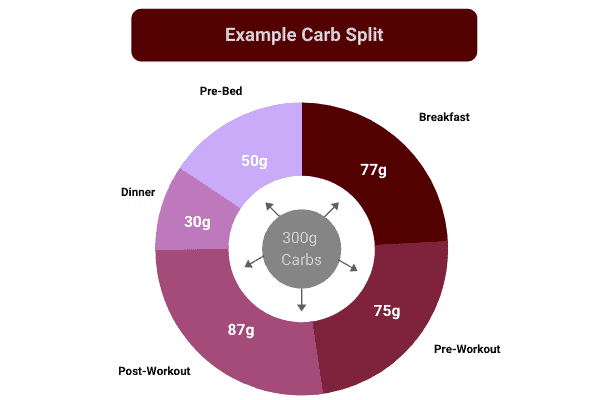
Firstly, strategic carb eating involves spreading your carb intake throughout the day.
By spreading your carbs over multiple meals, you reduce the uncomfortably “full” feeling which is often associated with eating a bucketload of carbohydrates.
Secondly, strategic carb eating involves allocating the majority of your carb intake to certain periods of the day.
The best times to consume carbs are:
- Breakfast.
- Pre-workout.
- Post-workout.
By allocating the majority of your carbohydrates to these periods, you are playing to your natural hormonal rhythm.
Breakfast and post-workout periods are when your blood sugar levels are at their lowest. And this is also when the hormone ghrelin is most prevalent in your circulation.(8)
Ghrelin is the hunger hormone.
Therefore allocating your carbs to periods where you are hungriest, will naturally help you to consume more carbs.
Similarly, allocating a high-carb intake to a pre-workout meal will allow those carbs to be quickly burnt off during your workout.
And this will allow you to consume more carbs after the workout when you are likely to be hungry.
Summary
Strategic consumption will allow you to eat more carbohydrates throughout the day. Spread your carbohydrate intake over multiple meals, allocating most of your intake to breakfast, pre-workout, and post-workout meals. These are periods when your body requires the most carbohydrates. And this will also maximize glycogen replenishment.
An Example Meal Plan To Eat 300g Of Carbs A Day
Now I will take everything together to give you an example meal plan.
Hopefully, this will give you the inspiration required to start eating the high-carb diet you need to start making muscle gains!
Here is how I would eat 300g of carbs a day.
1. Breakfast Oats (77g Carbohydrates)
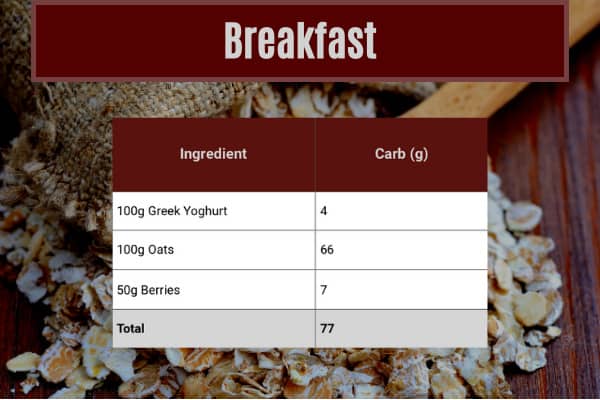
Breakfast contains a total of 77 grams of carbohydrates.
This is one of the most important meals of the day. That’s because your body has essentially fasted for 8 hours (or however long you sleep).
By the time you wake up, your muscles are ravenous for energy.
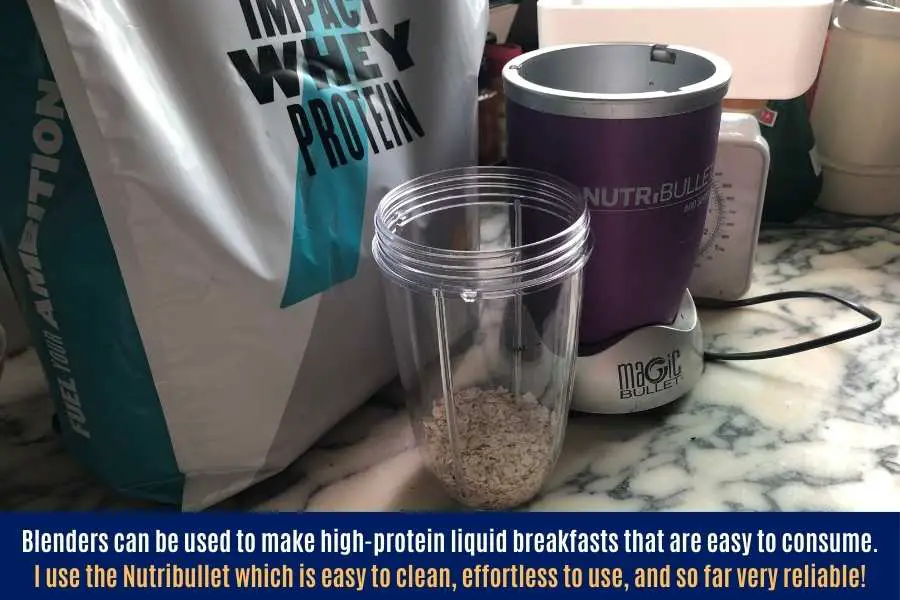
Most of the carbohydrates from this breakfast come as complex carbohydrates from the oats. This will set your metabolic engine burning as soon as you wake up.
Additionally, you also get a hit of simple carbs from the yogurt and berries. And this will help top up your muscular glycogen.
This breakfast is easy to prepare and appetizing. But to make it even more appetizing, you can add more fruit!
Check out my other article to learn how to use oats to make your own mass gainer!
2. Pre-Workout Pasta (75g Carbohydrates)
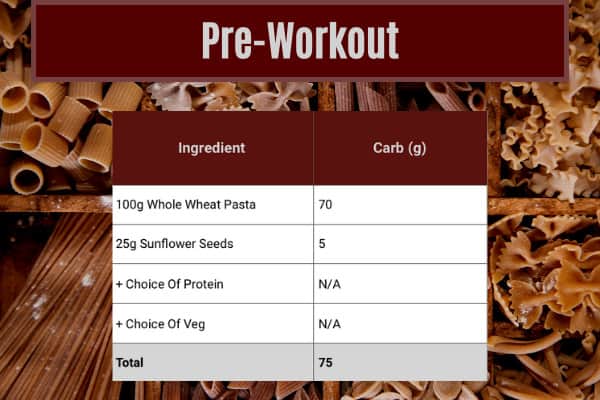
Your pre-workout meal contains a total of 75 grams of carbohydrates.
A nutritious pre-workout meal is essential to provide the energy for an intense workout. And this will serve to maximize muscle gains.
As such, all of these carbs come from complex carbohydrates in pasta and sunflower seeds. This will provide a steady source of energy as you lift your weights.
Additionally, allocating a large portion of carbs to your pre-workout will give you a good window of opportunity to burn them off immediately. And this will help you to eat more later during the day without feeling overly full.
You can also add your choice of protein and veg to complete your macronutrient profile.
3. Post-Workout Sandwich (87g Carbohydrates)
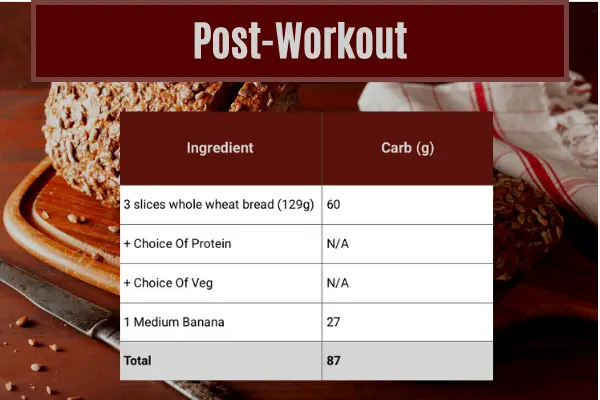
Your post-workout meal contains a total of 87 grams of carbohydrates.
A post-workout meal is just as important as a pre-workout. This is because you need to replenish the glycogen which becomes depleted during a workout.
As such, this post-workout meal contains a hit of simple carbs from the banana (which is quickly digested and absorbed)
Bananas are an awesome way to increase your carb intake. They are calorie-dense, and they taste delicious!
But it’s best to eat them either before or after a workout to ensure the sugars are quickly burnt off or used for glycogen repletion.
You can check out my other article to find out why bananas are great for bulking up!
4. Dinner (30g Carbohydrates)
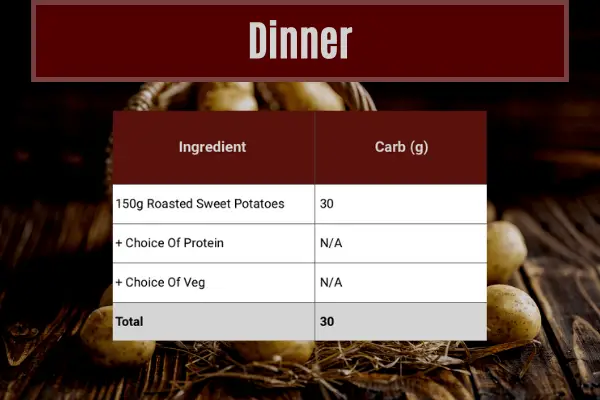
Your dinner meal contains a total of 30 grams of carbohydrates.
The purpose of dinner is to maintain your blood sugar levels for glycogen repletion.
As such dinner offers a degree of flexibility in terms of how much carbs you consume.
You can either consume more carbs at dinner or less for your pre-bed snack (see below). Or you can consume fewer carbs at dinner, and more for your pre-bed snack.
Sweet potatoes are a nutritious ingredient to bulk on. Not only do they contain high levels of complex carbohydrates, but they also contain fiber and plant protein.
As a bonus- they taste amazing too!
Check out my other article for more ideas on how to increase your protein intake!
5. Pre-Bed Cheesy Crackers (50g Carbohydrates)
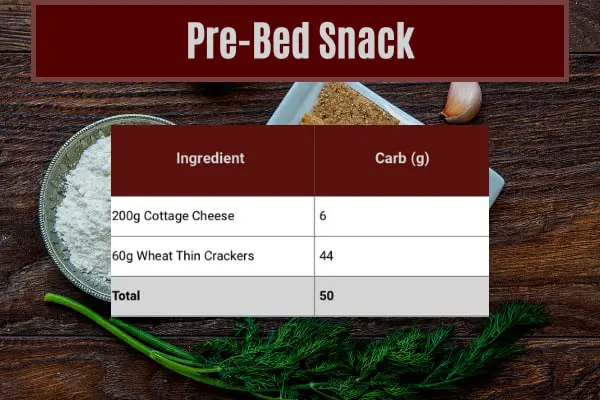
The final meal of the day is a large snack before bed. And it contains 50 grams of carbohydrates.
The main purpose of the pre-bed meal is to top up your protein levels before bed. And this is done to limit catabolism (muscle breakdown) as you sleep.
But the pre-bed snack is also a great way to include a hit of carbohydrates too.
Simply serve cottage cheese on wheat crackers for a convenient and nutritious meal.
If you would rather not eat so many carbs before bed, you can allocate a larger portion of carbohydrates to dinner instead.
Summary
300+ grams of carbohydrates can be split over 5 meals throughout the day. The most important meals for muscle growth are breakfast, pre-workout, and post-workout meals. As such, you should allocate the majority of your carbohydrate intake to these 3 meals.
Delicious Carbs Are Easy To Eat Carbs
From my own personal experience, carbs are one of the hardest macronutrients to eat.
Mainly because they are often bland-tasting, and you require so damn much!
Finding ways to make your carbs taste delicious is a simple way to hit your daily carb targets.
Here are my favorite ways to make carbohydrates easier to consume.
1. Boil Rice In Stock And Herbs
Let’s face it- plain rice isn’t the most exhilarating food in the world.
But it’s an amazing source of carbs.
To liven things up, you can add stock cubes, herbs, and spices to the water. The rice will end up absorbing the flavors to make a delicious dish!
Alternatively, add soy sauce to your rice! Soy sauce is relatively fat-free. But watch out for the sodium levels.
2. Mash Your Potatoes
Solid potatoes can be hard to eat as they are.
Try mashing them with some milk instead.
This will produce a more liquid consistency, which makes it much easier to eat.
Get a big spoonful and swallow it like a shake!
3. Make A Pasta Bean Salad
Pasta is usually served with a sauce to liven things.
But if you don’t fancy eating your pasta with sauce, an alternative is to add some beans and veg to make a pasta bean salad.
You can also drizzle a bit of olive oil, and add salt and pepper.
This creates a delicious and carb-packed base onto which you can add some protein.
I like eating this with grilled chicken!
4. Liquidate Your Oats
Oats are another bland carb to eat. Especially during breakfast, when you really want something sweet instead.
But it’s easy to make oats more ingestible.
Simply blitz your oats into a powder using a blender.
Then you can add milk, fruits, and even strawberry whey protein powder.
This will create a nice shake that you can gulp down relatively stress-free.
5. Toast Your Bread.
Most people love white bread. But the carbs are refined, and not as healthy as brown bread.
In contrast, brown bread is packed with healthy complex carbs but generally receives a less warming reception.
It’s tough, mealy, and less palatable.
But by simply toasting the bread, you can make it more appetizing!
It sounds simple, but I found this a great way to make brown bread easier to consume. I love using half-toasted slices in my sandwiches!
5. Consume A Mass Gainer Shake
This is probably the easiest way to eat carbs.
A mass gainer shake typically contains anywhere between 30-100g of carbs and sometimes even more.
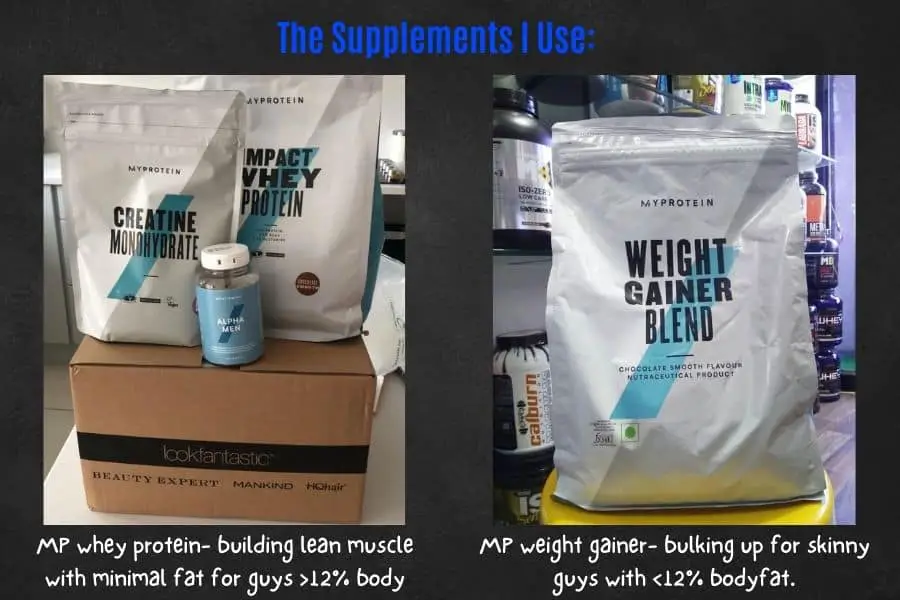
I’ve used the MyProtein Weight Gainer blend in the past to help me quickly bulk up.
Each serving contains 50g of carbs.
It’s tasty and easy to mix.
I’ve since converted to Optimum nutrition as I prefer the taste!
You can check out my other article to find out how long it takes for a skinny guy to gain muscle!
Conclusion
Finito!
Today I have shown you how to eat 300g of carbs a day.
This is by no means easy. But it’s achievable.
The first thing you need to do is create a meal plan that spreads those 300 grams over 5 or more meals throughout the day. Additionally, you should strategically consume the majority of your carbs at breakfast, before your workout, and after your workout.
These are periods when your body will have the greatest use for carbs. Consequently, they will be burned off faster, allowing you to eat more carbs later in the day without that sickly bloated feeling.
You can also cook your carbs in a more appetizing way. And this will make them much easier to consume!
How do you like to eat your carbs?
Feel free to send me a message if you have any questions! You can find my details on the “contact us” page.
You may also be interested in the downloadable Kalibre Blueprint PDF which details exactly how I gained 40lbs of lean muscle (it’s 100% free!). It details the exact exercises and nutrition (with printable worksheets) I used to go from skinny to ripped!
Thanks for reading guys!
Peace Out,
Kal
(Biochemistry BSc, Biomedical Sciences MSc, Ex-Skinny Guy)
Thanks for reading guys!
Peace Out,
Kal
(Biochemistry BSc, Biomedical Sciences MSc, Ex-Skinny Guy)

